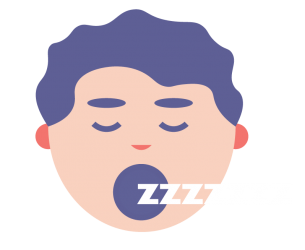DO YOU SNORE?
Snoring occurs due to relaxation of the muscles behind and around the tongue when we fall asleep. It may be a significant health issue or a social problem, effecting the sleep of those around you.

What to do about snoring:
Lose weight — Usually losing 15-30 pounds can help
Avoid sleeping on your back — Home remedies include sewing a tennis ball to the back of your T-shirt or wearing a stuffed backpack. Buy one of the many commercial positioning devices available that remind you to stay off your back. Or use an adjustable bed or wedge so you sleep in an upright position.
Treat nasal congestion — Some people who snore are helped with nasal breathing strips or nose cones that dilate the nasal passage. If you have allergies, avoid irritants (those in the air or food, such as dairy) and use antihistamine and/or a nasal spray containing saline or a steroid.
Quit smoking — Smoke irritates the lining of the nose and throat, causing it to become inflamed, which can lead to snoring
Get enough sleep – When you are really tired, your normal sleep cycles maybe altered resulting in more relaxation of the muscles of your throat and an increase in volume and amount of snoring. Most adults need 7+ hours of sleep regularly to feel rested.
Avoid substance use — Alcohol, sedatives and pain pills relax the airway muscles and can result in snoring. Avoid alcohol 3-4 hours prior to bedtime.
Other treatment options — exercises that strengthen the airway muscles, dental appliances or surgeries of the upper airway that can remove very large tonsils or correct a crooked nose (deviated septum).
Signs that snoring is a serious problem, maybe sleep apnea:
- Occurs with witnessed apneas (pauses in breathing)
- Causes frequent awakenings, sometimes along with gasping or snorting
- Leads to daytime sleepiness, especially when driving or while at work
- Occurs along with high blood pressure, heart/lung or neuromuscular disease, insomnia or depression/anxiety

Snoring is rarely normal in children, so if it’s frequent and not associated with a cold or allergies, it should be evaluated.


Take the “4 Week Sleep Challenge” to learn more about your sleep pattern.
The better your sleep habits, the better you’ll feel!
